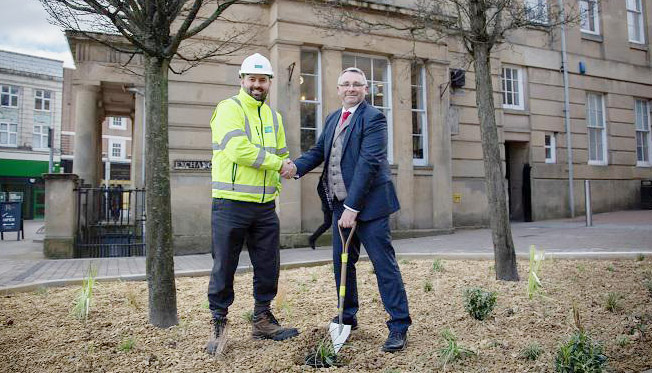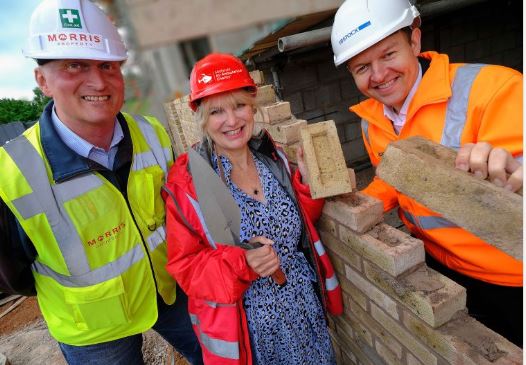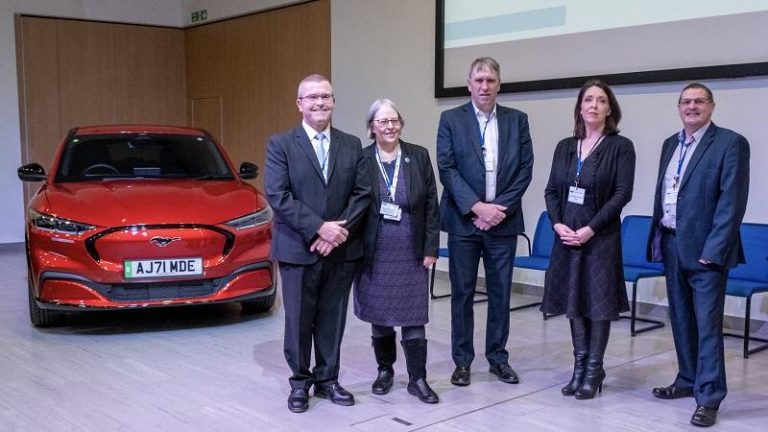| Region | 2023 GVA Growth | Region | Annualised GVA Growth 2024-26 |
| London | -0.2% | London | 2.6% |
| Scotland | -0.6% | South East | 2.2% |
| UK | -0.6% | UK | 2.1% |
| East | -0.7% | South West | 2.1% |
| Northern Ireland | -0.7% | East | 2.1% |
| South East | -0.7% | West Midlands | 2.1% |
| North West | -0.7% | North West | 2.0% |
| Wales | -0.8% | Northern Ireland | 1.9% |
| South West | -0.8% | East Midlands | 1.9% |
| North East | -0.8% | Wales | 1.7% |
| West Midlands | -0.8% | Yorkshire & the Humber | 1.7% |
| Yorkshire & the Humber | -1.0% | North East | 1.7% |
| East Midlands | -1.0% | Scotland | 1.7% |
East Midlands’ Information and Communications sector forecast to be UK’s fastest growing sector in 2024-26
EMEC welcomes ex-army captain as new project manager
Leicestershire businesses focus on skills, costs, and exports as region moves on from lockdown
Small businesses in Leicester and Leicestershire continue to keep a close eye on skills, costs, and exports as the region moved past lockdown and addressed new challenges.
Results from the latest Leicester and Leicestershire Enterprise Partnership (LLEP) Business Tracker Survey, conducted in December 2022, have now been published.
They show the responses from local SMEs to the latest of four surveys, each of which has checked the pulse of businesses over the last two years.
The purpose of the project throughout has been to better understand, and respond to, the needs of local businesses as a consequence of the pandemic.
The first survey was conducted in December 2020 and provided officers with data around how business was managing the impact of Covid-19.
Data has provided an insight into local business confidence, where support has been required, been used as evidence for funding bids, and shown how businesses have adapted.
The sequence started two years ago and 118 businesses participated in the fourth and final survey.
Tracker survey data has been used to support successful bids for the £3m Made Smarter programme, which is supporting digitalisation of East Midlands manufacturing businesses, and the £1.3m Create Growth programme, which is helping East Midlands creative businesses to grow.
Headlines from the final survey include:
-
Only 30% of organisations were satisfied with their workforce’s basic skills. This is the lowest level recorded and fits with anecdotal evidence from local businesses that new starters may have missed out on learning ‘soft skills’ in a physical working environment.
-
There remain many skills challenges to address. The LLEP is now working to improve alignment between skills required by businesses and how schools and further education support students to meet these challenges.
-
Recruitment difficulties also remain. Businesses are responding with salary rises and increased training. In total, 38% of businesses had experienced difficulties with recruitment during the last six months. More than two-fifths of businesses have capacity to offer work experience.
-
Europe continues to be the key trading partner for both imports and exports. More than 50% of those involved in exporting were experiencing challenges, which most blamed on the UK’s exit from the EU. Import challenges were blamed both on Brexit and shipping issues.
-
Around 8% of businesses are struggling to repay Government support accessed during the pandemic. This is likely to become a more serious issue once increased costs associated with cost of living and energy prices are factored in.
-
About 57% of businesses have been significantly impacted by inflation of raw material costs. Shipping costs and utility prices also factored, with most businesses raising their own prices, as well as looking for cost and supply chain savings.
Andy Reed OBE, co-chair of the LLEP Board, said: “The survey has covered themes that directly impact local businesses of all sizes, from skills and recruitment to digital investment and exporting patterns.
“What it has shown us is that the situation remains delicate for many small businesses in the region.
“This time a year ago, 90% were cautiously optimistic about the future, but that has since slid to just over eight in ten as the impact of inflation began to bite.
“We will continue to use the data from all four tracker surveys to inform programmes and policy at the LLEP as we move forward.”
The survey went to businesses ranging from two to 249 employees. About a quarter were based in the city, with the remainder operating across Leicestershire.
Businesses covered a range of sectors, from agriculture and construction through to logistics, education, hospitality and the arts.
Funding awarded to accelerate growth of Nottingham’s medtech businesses
Key milestone reached in Severn Trent’s £76m Mansfield makeover
Nottingham homeless to benefit from local man’s Antarctica trip
Proposals revealed to transform Northampton car park into Heritage Park
- Saturday 4 March from 10am – 4pm at the Grosvenor Centre outside the Primark unit on the ground floor
- Wednesday 15March between 4:30pm – 7:30pm at Springs Family Centre, 9 Tower Street, NN1 2SN.
Ibstock Brick donation helps Air Ambulance build new HQ
Industries come together to learn more about workplace wellbeing
Losses widen at Oncimmune
Dr Adam M Hill, CEO of Oncimmune, said: “FY2022 was a period of investment in the ImmunoINSIGHTS platform following a successful, oversubscribed fundraise in March 2021, which allowed us to evolve our offering, substantially increase capacity and drive our pipeline.
“The short-term impact of investment and effort has been to increase the quality of our revenue, with more partners opting for multi-year Master Service Agreements in order to access the platform across multiple studies.
“The medium-term impact is likely to result from the development of novel IP related to immune-related diseases, in which Oncimmune is recognised as expert, and their treatment.
“These developments would not have been possible without both our people and all of our stakeholders, including our finance providers, who remain steadfast in their commitment and unwavering support and who we would like to thank.
“The ImmunoINSIGHTS business is now seeing improving growth in the first half of this financial year and has a growing number of contracts.
“Whilst short-term challenges remain in the operating environment and in financing, the Board is determined to meet these and to enable conversion of the growing pipeline of opportunities to deliver the significant returns available from our differentiated offering and expertise.”












